Analysis of Interpersonal Communication Skills in Role Play Scenario
VerifiedAdded on 2021/12/03
|5
|1318
|22
Report
AI Summary
This report offers a self-reflective analysis of interpersonal communication skills as applied in a role-play scenario where the student assumed the role of a career advisor. The introduction emphasizes the significance of self-reflection in learning and the importance of interpersonal communication in both personal and professional contexts. The analysis delves into the student's strengths, such as active listening and questioning skills, and identifies areas for improvement, including biases and preconceptions that might influence interactions with clients. The student reflects on their ability to paraphrase and understand non-verbal cues, highlighting a specific instance where they advised a student. The report concludes with an action plan that includes maintaining a self-reflective journal and utilizing self-help resources to enhance interpersonal communication skills. The student aims to improve their ability to handle biases and provide more comprehensive advice, ultimately contributing to their professional development.
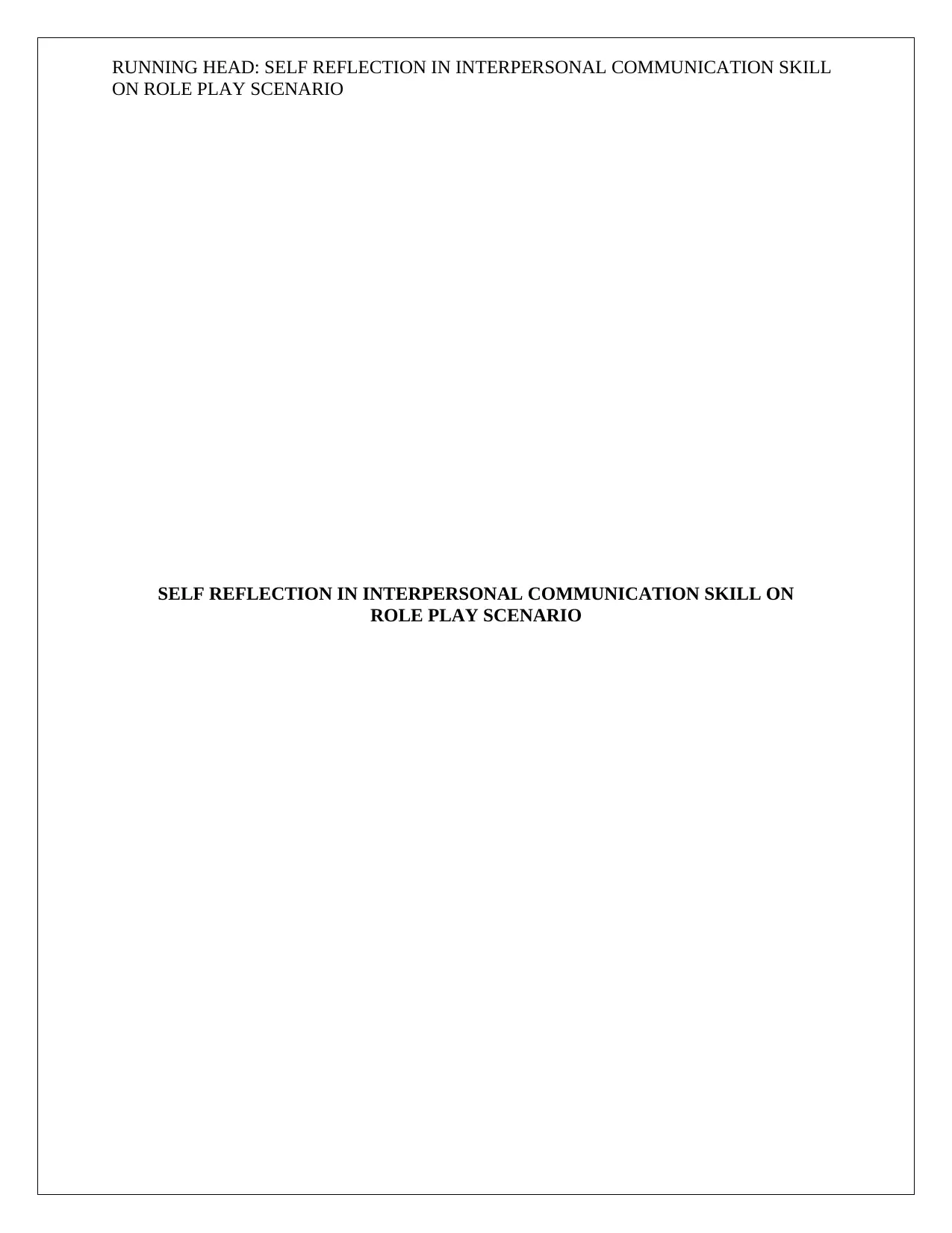
RUNNING HEAD: SELF REFLECTION IN INTERPERSONAL COMMUNICATION SKILL
ON ROLE PLAY SCENARIO
SELF REFLECTION IN INTERPERSONAL COMMUNICATION SKILL ON
ROLE PLAY SCENARIO
ON ROLE PLAY SCENARIO
SELF REFLECTION IN INTERPERSONAL COMMUNICATION SKILL ON
ROLE PLAY SCENARIO
Paraphrase This Document
Need a fresh take? Get an instant paraphrase of this document with our AI Paraphraser
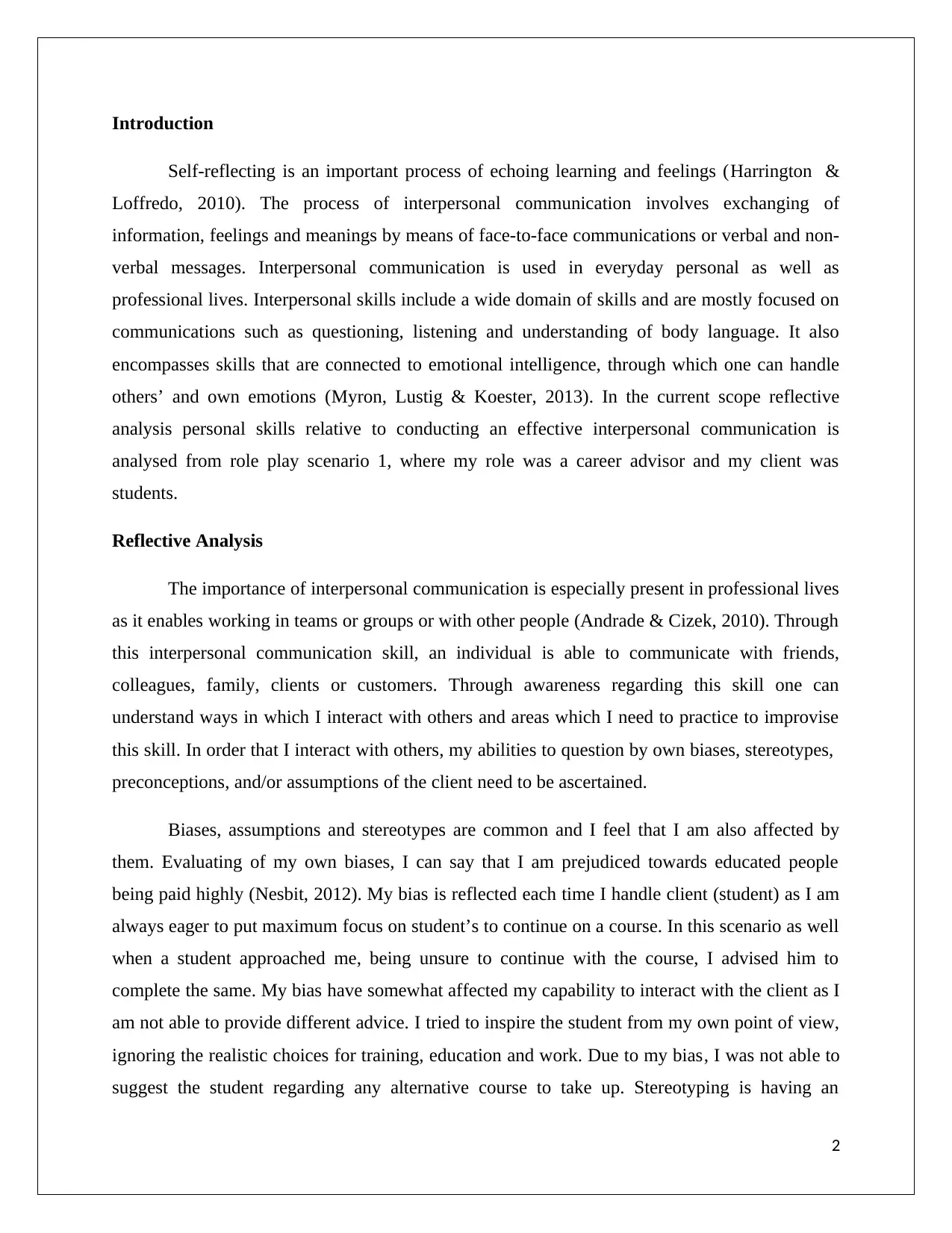
Introduction
Self-reflecting is an important process of echoing learning and feelings (Harrington &
Loffredo, 2010). The process of interpersonal communication involves exchanging of
information, feelings and meanings by means of face-to-face communications or verbal and non-
verbal messages. Interpersonal communication is used in everyday personal as well as
professional lives. Interpersonal skills include a wide domain of skills and are mostly focused on
communications such as questioning, listening and understanding of body language. It also
encompasses skills that are connected to emotional intelligence, through which one can handle
others’ and own emotions (Myron, Lustig & Koester, 2013). In the current scope reflective
analysis personal skills relative to conducting an effective interpersonal communication is
analysed from role play scenario 1, where my role was a career advisor and my client was
students.
Reflective Analysis
The importance of interpersonal communication is especially present in professional lives
as it enables working in teams or groups or with other people (Andrade & Cizek, 2010). Through
this interpersonal communication skill, an individual is able to communicate with friends,
colleagues, family, clients or customers. Through awareness regarding this skill one can
understand ways in which I interact with others and areas which I need to practice to improvise
this skill. In order that I interact with others, my abilities to question by own biases, stereotypes,
preconceptions, and/or assumptions of the client need to be ascertained.
Biases, assumptions and stereotypes are common and I feel that I am also affected by
them. Evaluating of my own biases, I can say that I am prejudiced towards educated people
being paid highly (Nesbit, 2012). My bias is reflected each time I handle client (student) as I am
always eager to put maximum focus on student’s to continue on a course. In this scenario as well
when a student approached me, being unsure to continue with the course, I advised him to
complete the same. My bias have somewhat affected my capability to interact with the client as I
am not able to provide different advice. I tried to inspire the student from my own point of view,
ignoring the realistic choices for training, education and work. Due to my bias, I was not able to
suggest the student regarding any alternative course to take up. Stereotyping is having an
2
Self-reflecting is an important process of echoing learning and feelings (Harrington &
Loffredo, 2010). The process of interpersonal communication involves exchanging of
information, feelings and meanings by means of face-to-face communications or verbal and non-
verbal messages. Interpersonal communication is used in everyday personal as well as
professional lives. Interpersonal skills include a wide domain of skills and are mostly focused on
communications such as questioning, listening and understanding of body language. It also
encompasses skills that are connected to emotional intelligence, through which one can handle
others’ and own emotions (Myron, Lustig & Koester, 2013). In the current scope reflective
analysis personal skills relative to conducting an effective interpersonal communication is
analysed from role play scenario 1, where my role was a career advisor and my client was
students.
Reflective Analysis
The importance of interpersonal communication is especially present in professional lives
as it enables working in teams or groups or with other people (Andrade & Cizek, 2010). Through
this interpersonal communication skill, an individual is able to communicate with friends,
colleagues, family, clients or customers. Through awareness regarding this skill one can
understand ways in which I interact with others and areas which I need to practice to improvise
this skill. In order that I interact with others, my abilities to question by own biases, stereotypes,
preconceptions, and/or assumptions of the client need to be ascertained.
Biases, assumptions and stereotypes are common and I feel that I am also affected by
them. Evaluating of my own biases, I can say that I am prejudiced towards educated people
being paid highly (Nesbit, 2012). My bias is reflected each time I handle client (student) as I am
always eager to put maximum focus on student’s to continue on a course. In this scenario as well
when a student approached me, being unsure to continue with the course, I advised him to
complete the same. My bias have somewhat affected my capability to interact with the client as I
am not able to provide different advice. I tried to inspire the student from my own point of view,
ignoring the realistic choices for training, education and work. Due to my bias, I was not able to
suggest the student regarding any alternative course to take up. Stereotyping is having an
2
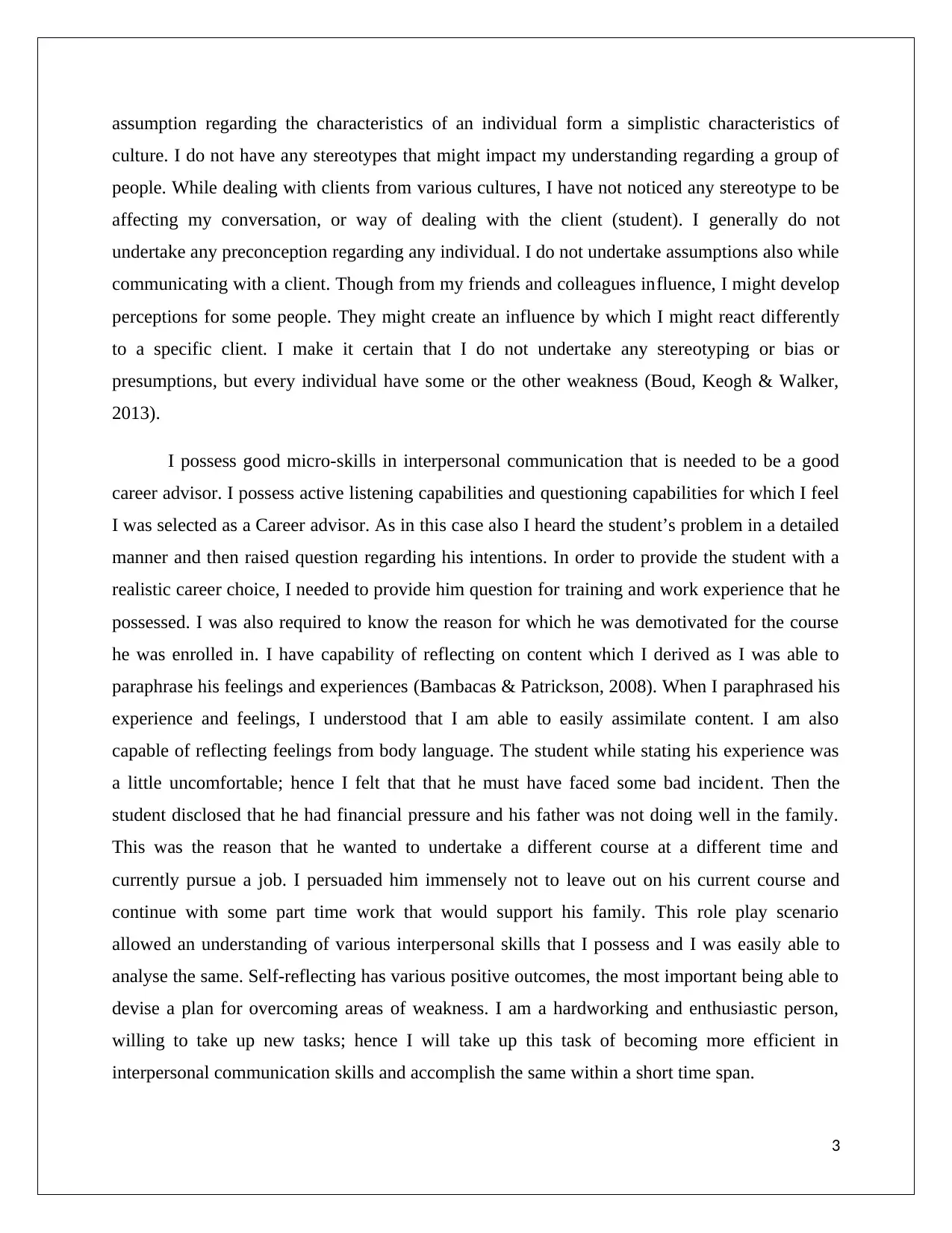
assumption regarding the characteristics of an individual form a simplistic characteristics of
culture. I do not have any stereotypes that might impact my understanding regarding a group of
people. While dealing with clients from various cultures, I have not noticed any stereotype to be
affecting my conversation, or way of dealing with the client (student). I generally do not
undertake any preconception regarding any individual. I do not undertake assumptions also while
communicating with a client. Though from my friends and colleagues influence, I might develop
perceptions for some people. They might create an influence by which I might react differently
to a specific client. I make it certain that I do not undertake any stereotyping or bias or
presumptions, but every individual have some or the other weakness (Boud, Keogh & Walker,
2013).
I possess good micro-skills in interpersonal communication that is needed to be a good
career advisor. I possess active listening capabilities and questioning capabilities for which I feel
I was selected as a Career advisor. As in this case also I heard the student’s problem in a detailed
manner and then raised question regarding his intentions. In order to provide the student with a
realistic career choice, I needed to provide him question for training and work experience that he
possessed. I was also required to know the reason for which he was demotivated for the course
he was enrolled in. I have capability of reflecting on content which I derived as I was able to
paraphrase his feelings and experiences (Bambacas & Patrickson, 2008). When I paraphrased his
experience and feelings, I understood that I am able to easily assimilate content. I am also
capable of reflecting feelings from body language. The student while stating his experience was
a little uncomfortable; hence I felt that that he must have faced some bad incident. Then the
student disclosed that he had financial pressure and his father was not doing well in the family.
This was the reason that he wanted to undertake a different course at a different time and
currently pursue a job. I persuaded him immensely not to leave out on his current course and
continue with some part time work that would support his family. This role play scenario
allowed an understanding of various interpersonal skills that I possess and I was easily able to
analyse the same. Self-reflecting has various positive outcomes, the most important being able to
devise a plan for overcoming areas of weakness. I am a hardworking and enthusiastic person,
willing to take up new tasks; hence I will take up this task of becoming more efficient in
interpersonal communication skills and accomplish the same within a short time span.
3
culture. I do not have any stereotypes that might impact my understanding regarding a group of
people. While dealing with clients from various cultures, I have not noticed any stereotype to be
affecting my conversation, or way of dealing with the client (student). I generally do not
undertake any preconception regarding any individual. I do not undertake assumptions also while
communicating with a client. Though from my friends and colleagues influence, I might develop
perceptions for some people. They might create an influence by which I might react differently
to a specific client. I make it certain that I do not undertake any stereotyping or bias or
presumptions, but every individual have some or the other weakness (Boud, Keogh & Walker,
2013).
I possess good micro-skills in interpersonal communication that is needed to be a good
career advisor. I possess active listening capabilities and questioning capabilities for which I feel
I was selected as a Career advisor. As in this case also I heard the student’s problem in a detailed
manner and then raised question regarding his intentions. In order to provide the student with a
realistic career choice, I needed to provide him question for training and work experience that he
possessed. I was also required to know the reason for which he was demotivated for the course
he was enrolled in. I have capability of reflecting on content which I derived as I was able to
paraphrase his feelings and experiences (Bambacas & Patrickson, 2008). When I paraphrased his
experience and feelings, I understood that I am able to easily assimilate content. I am also
capable of reflecting feelings from body language. The student while stating his experience was
a little uncomfortable; hence I felt that that he must have faced some bad incident. Then the
student disclosed that he had financial pressure and his father was not doing well in the family.
This was the reason that he wanted to undertake a different course at a different time and
currently pursue a job. I persuaded him immensely not to leave out on his current course and
continue with some part time work that would support his family. This role play scenario
allowed an understanding of various interpersonal skills that I possess and I was easily able to
analyse the same. Self-reflecting has various positive outcomes, the most important being able to
devise a plan for overcoming areas of weakness. I am a hardworking and enthusiastic person,
willing to take up new tasks; hence I will take up this task of becoming more efficient in
interpersonal communication skills and accomplish the same within a short time span.
3
⊘ This is a preview!⊘
Do you want full access?
Subscribe today to unlock all pages.

Trusted by 1+ million students worldwide
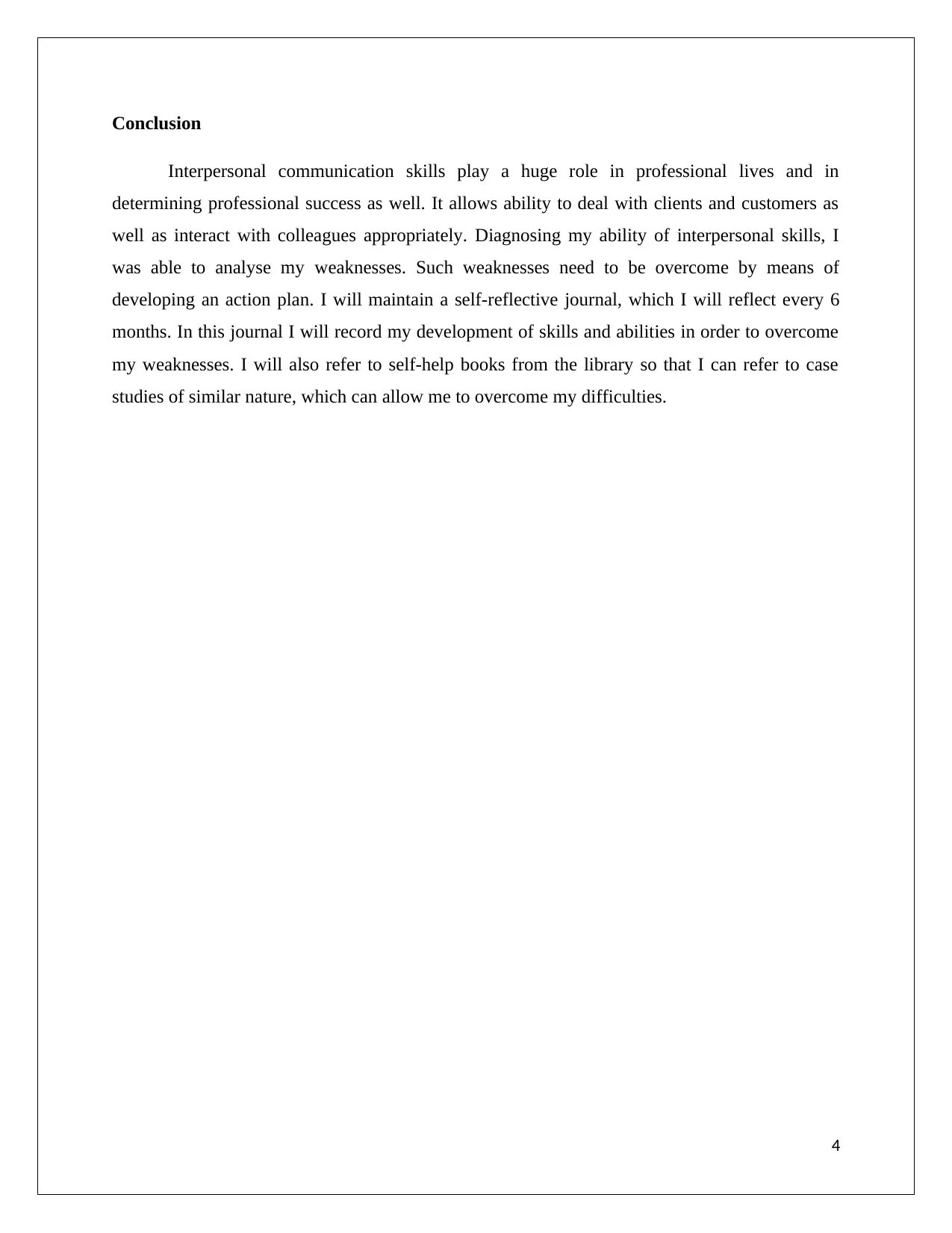
Conclusion
Interpersonal communication skills play a huge role in professional lives and in
determining professional success as well. It allows ability to deal with clients and customers as
well as interact with colleagues appropriately. Diagnosing my ability of interpersonal skills, I
was able to analyse my weaknesses. Such weaknesses need to be overcome by means of
developing an action plan. I will maintain a self-reflective journal, which I will reflect every 6
months. In this journal I will record my development of skills and abilities in order to overcome
my weaknesses. I will also refer to self-help books from the library so that I can refer to case
studies of similar nature, which can allow me to overcome my difficulties.
4
Interpersonal communication skills play a huge role in professional lives and in
determining professional success as well. It allows ability to deal with clients and customers as
well as interact with colleagues appropriately. Diagnosing my ability of interpersonal skills, I
was able to analyse my weaknesses. Such weaknesses need to be overcome by means of
developing an action plan. I will maintain a self-reflective journal, which I will reflect every 6
months. In this journal I will record my development of skills and abilities in order to overcome
my weaknesses. I will also refer to self-help books from the library so that I can refer to case
studies of similar nature, which can allow me to overcome my difficulties.
4
Paraphrase This Document
Need a fresh take? Get an instant paraphrase of this document with our AI Paraphraser
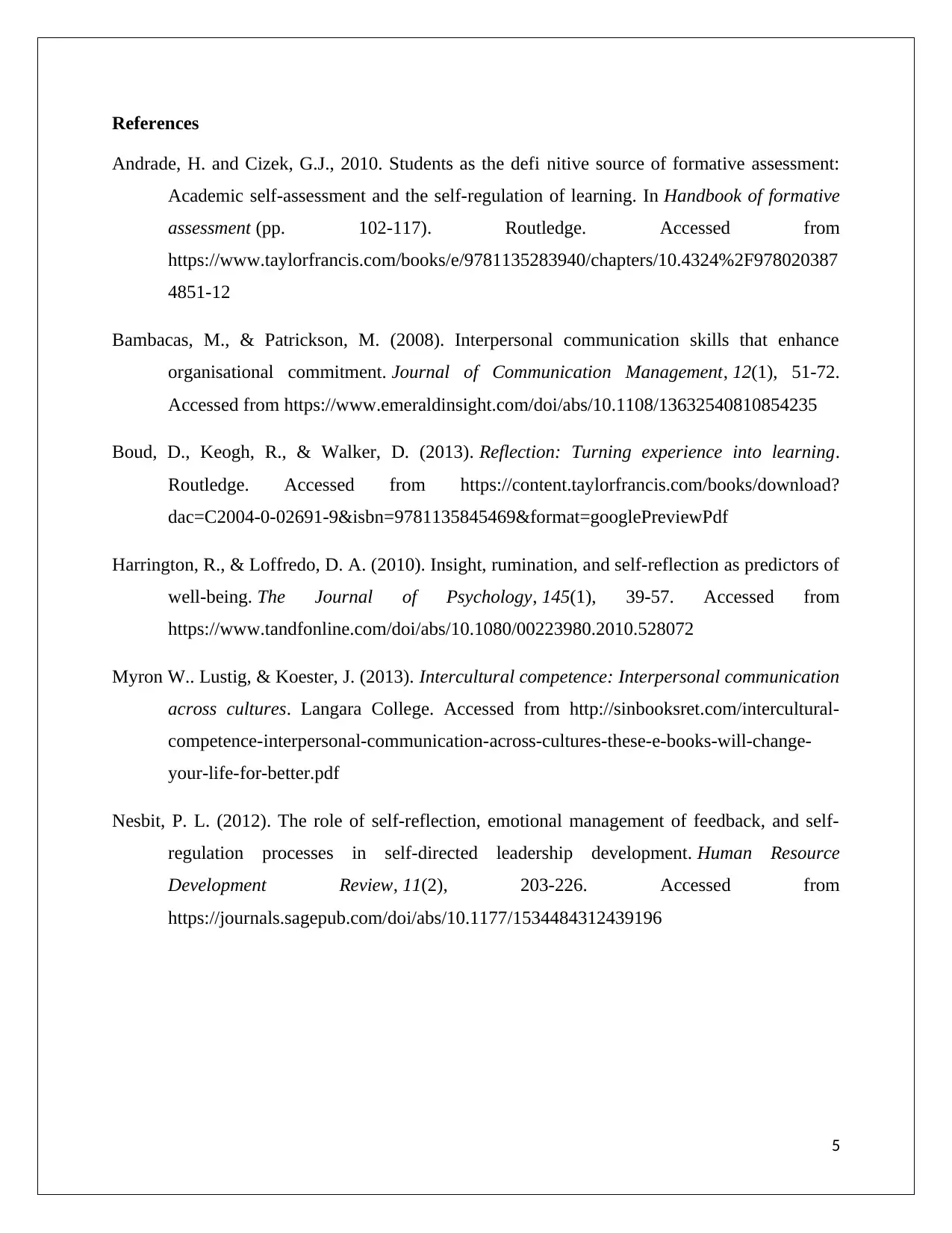
References
Andrade, H. and Cizek, G.J., 2010. Students as the defi nitive source of formative assessment:
Academic self-assessment and the self-regulation of learning. In Handbook of formative
assessment (pp. 102-117). Routledge. Accessed from
https://www.taylorfrancis.com/books/e/9781135283940/chapters/10.4324%2F978020387
4851-12
Bambacas, M., & Patrickson, M. (2008). Interpersonal communication skills that enhance
organisational commitment. Journal of Communication Management, 12(1), 51-72.
Accessed from https://www.emeraldinsight.com/doi/abs/10.1108/13632540810854235
Boud, D., Keogh, R., & Walker, D. (2013). Reflection: Turning experience into learning.
Routledge. Accessed from https://content.taylorfrancis.com/books/download?
dac=C2004-0-02691-9&isbn=9781135845469&format=googlePreviewPdf
Harrington, R., & Loffredo, D. A. (2010). Insight, rumination, and self-reflection as predictors of
well-being. The Journal of Psychology, 145(1), 39-57. Accessed from
https://www.tandfonline.com/doi/abs/10.1080/00223980.2010.528072
Myron W.. Lustig, & Koester, J. (2013). Intercultural competence: Interpersonal communication
across cultures. Langara College. Accessed from http://sinbooksret.com/intercultural-
competence-interpersonal-communication-across-cultures-these-e-books-will-change-
your-life-for-better.pdf
Nesbit, P. L. (2012). The role of self-reflection, emotional management of feedback, and self-
regulation processes in self-directed leadership development. Human Resource
Development Review, 11(2), 203-226. Accessed from
https://journals.sagepub.com/doi/abs/10.1177/1534484312439196
5
Andrade, H. and Cizek, G.J., 2010. Students as the defi nitive source of formative assessment:
Academic self-assessment and the self-regulation of learning. In Handbook of formative
assessment (pp. 102-117). Routledge. Accessed from
https://www.taylorfrancis.com/books/e/9781135283940/chapters/10.4324%2F978020387
4851-12
Bambacas, M., & Patrickson, M. (2008). Interpersonal communication skills that enhance
organisational commitment. Journal of Communication Management, 12(1), 51-72.
Accessed from https://www.emeraldinsight.com/doi/abs/10.1108/13632540810854235
Boud, D., Keogh, R., & Walker, D. (2013). Reflection: Turning experience into learning.
Routledge. Accessed from https://content.taylorfrancis.com/books/download?
dac=C2004-0-02691-9&isbn=9781135845469&format=googlePreviewPdf
Harrington, R., & Loffredo, D. A. (2010). Insight, rumination, and self-reflection as predictors of
well-being. The Journal of Psychology, 145(1), 39-57. Accessed from
https://www.tandfonline.com/doi/abs/10.1080/00223980.2010.528072
Myron W.. Lustig, & Koester, J. (2013). Intercultural competence: Interpersonal communication
across cultures. Langara College. Accessed from http://sinbooksret.com/intercultural-
competence-interpersonal-communication-across-cultures-these-e-books-will-change-
your-life-for-better.pdf
Nesbit, P. L. (2012). The role of self-reflection, emotional management of feedback, and self-
regulation processes in self-directed leadership development. Human Resource
Development Review, 11(2), 203-226. Accessed from
https://journals.sagepub.com/doi/abs/10.1177/1534484312439196
5
1 out of 5
Related Documents
Your All-in-One AI-Powered Toolkit for Academic Success.
+13062052269
info@desklib.com
Available 24*7 on WhatsApp / Email
![[object Object]](/_next/static/media/star-bottom.7253800d.svg)
Unlock your academic potential
Copyright © 2020–2026 A2Z Services. All Rights Reserved. Developed and managed by ZUCOL.





